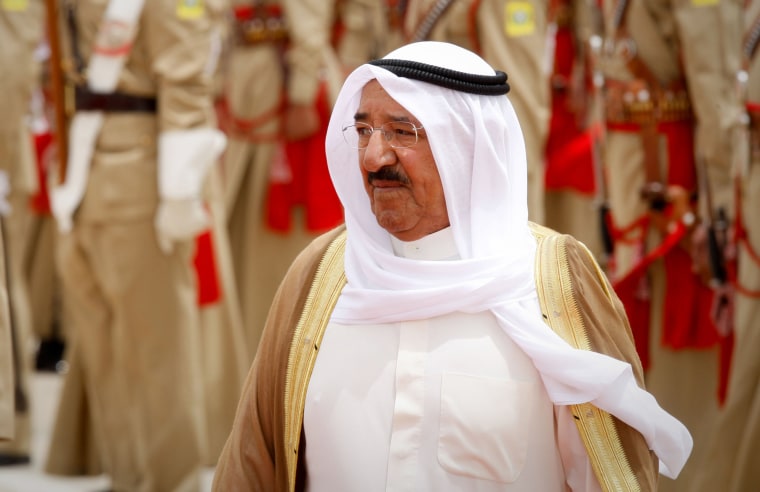The ruler of the oil-rich Gulf Arab kingdom of Kuwait, Sheikh Sabah Al Ahmad Al Sabah, has died, according to state television.
He was 91 and will be succeeded by his brother, the crown prince Sheikh Nawaf Al Ahmad Al Sabah, Kuwait's cabinet said Tuesday.
"With great sadness and sorrow, the Kuwaiti people, the Arab and Islamic nations and the friendly peoples of the world mourn the death of the late Highness Sheikh Sabah Al Ahmad Al Jaber Al Sabah, emir of the state of Kuwait, who has moved to the realm of his Lord," the royal palace said in a statement, according to Kuwaiti state television, without offering a cause of death.
State television announced his death on Tuesday after reciting Muslim prayers and Quranic verses.
Hours later, the National Assembly Speaker Marzouq Al Ghanim tweeted that Sheikh Sabah's half-brother Sheikh Nawaf, 83, would be sworn in on Wednesday by taking an oath in parliament.
The news of Sheikh Sabah's death comes just two months after the nonagenarian Arab ruler was flown to Rochester, Minnesota, in a U.S. Air Force C-17 for treatment at the Mayo Clinic,days after undergoing unspecified surgery at home.
Kuwait has been a staunch U.S. ally since the American-led war that expelled occupying Iraqi troops in the 1990s.
Slightly smaller than the state of New Jersey, it is home to some of the world's largest oil reserves.
Download the NBC News app for breaking news and politics
Sheikh Sabah had served as emir since 2006, after parliament voted unanimously to oust his predecessor just nine days into his rule.
Sheikh Sabah had pushed for diplomacy to solve regional issues, such as the ongoing boycott of Qatar by four Arab nations including Saudi Arabia, and hosted major donor conferences for war-torn Middle Eastern countries like Iraq and Syria.
His dramatic airlift to the United States in July had already sparked a debate about what Kuwait might look like after his death.
Kuwait has both a royal family and a parliamentary body, the National Assembly, making it the most democratic of the Gulf Cooperation Council countries, according to Bayly Winder, an analyst writing forthe Carnegie Endowment for International Peace, a foreign affairs think tank head-quartered in Washington.
Kuwait's next leader Sheikh Nawaf, temporarily assumed some of Sheikh Sabah's powers in July when he fell ill and was admitted to hospital in Kuwait.
The country of four million will now go into 40 days of mourning, according to a statement from Kuwait's cabinet, while nearby Egypt, Jordan, Oman and the United Arab Emirates each said they will observe three days of mourning.
"Today we lost a great brother and a wise leader," tweeted Jordan's King Abdullah, calling Sabah an "emir of humanity."
United Nations Secretary-General Antonio Guterres also praised the emir as "an extraordinary symbol of wisdom and generosity, a messenger of peace, a bridge builder."
President Donald Trump earlier this month awarded the U.S. Legion of Merit, Degree Chief Commander, to Sheikh Sabah in what the White House said was the first time the honor had been given since 1991. The emir's eldest son, Sheikh Nasser, accepted the award on his father's behalf.
Sheikh Sabah's greatest crisis came in 1990, when Iraqi dictator Saddam Hussein invaded Kuwait and occupied the nation for seven months. On Feb. 24, 1991, U.S. troops and their allies stormed into Kuwait ending the fighting just 100 hours later.
Today, Kuwait hosts some 13,500 American troops.
